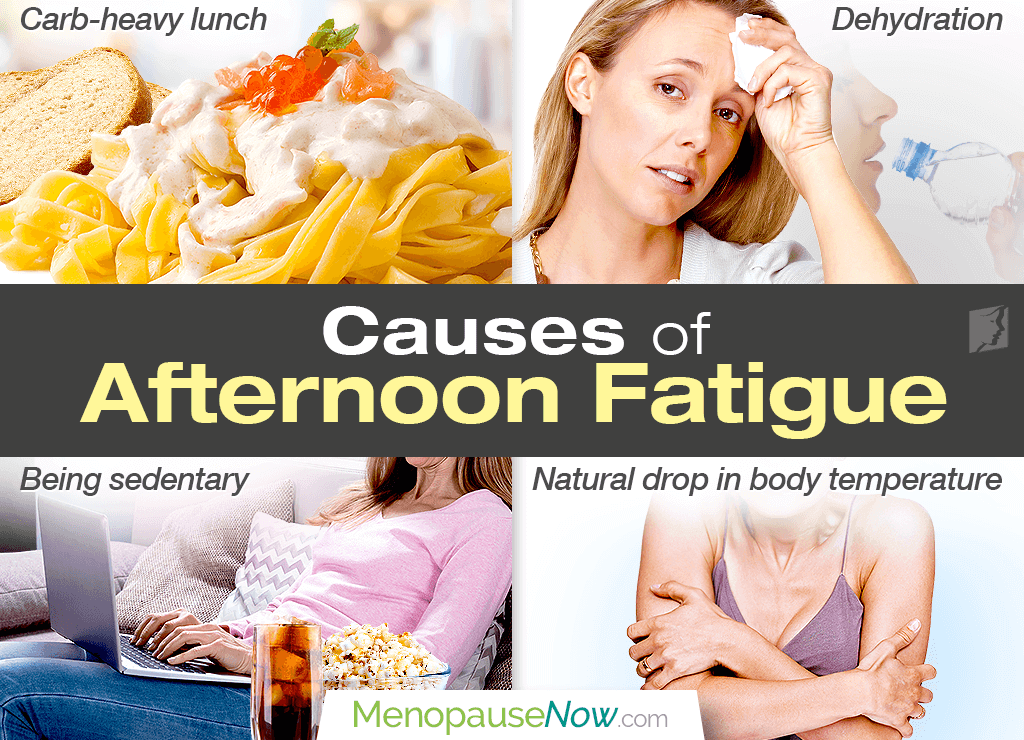Fatigue can take a drain on your day-to-day tasks, especially during the menopausal transition, making the prospect of doing anything seem daunting and impossible. Although it can strike at any time of day, it most famously rears its ugly head during afternoon hours.
Keep reading to find out causes and useful solutions to afternoon fatigue as well as ongoing fatigue so that you can get up and get going without delay.
Causes of Afternoon Fatigue
Women may suffer specifically from acute afternoon fatigue due to:
Carb-heavy lunch. Simple carbohydrates found in pastas, white breads, white rice, etc. cause a rapid spike in blood sugar, which is subsequently followed by a dramatic drop. This low can leave you feeling tired and irritable.
Dehydration. Mild dehydration - defined as a loss of 1.5 percent of your body's water weight - in the afternoon can leave you feeling sluggish and tired if you don't properly hydrate throughout the morning.
Being sedentary. The body associates stillness with going to sleep. Therefore, sitting still for too long can provoke not only afternoon fatigue, but drowsiness at any time of the day.
Natural drop in body temperature. During the early afternoon, there is a normal drop in core body temperature, which releases the hormone melatonin. Melatonin is responsible for regulating sleep cycles.
Other Causes of Ongoing Fatigue
Not Related to Menopause
Usually, fatigue that strikes at any hour can be attributed to unhealthy habits, many of which are aforementioned but also include an excess or lack of exercise.
Occasionally, it is due to an underlying medical condition, such as a thyroid disorder, diabetes, anemia, multiple sclerosis, inflammatory bowel disease, chronic infections, and more.
Nevertheless, the cause is a determined on a case-by-case basis, and a woman's age may be taken into consideration if she is nearing the end of her fertile years.
Related to Menopause
Causes of fatigue for women who are passing through the menopausal transition may be attributable to hormones.
Estrogen is the principal reproductive hormone in charge of regulating sleep and wakefulness, alongside others. On the other hand, progesterone helps regulate sleep induction.
With their decline and consistent fluctuations throughout perimenopause, women may suffer from fatigue as their normal sleep cycles are disrupted, and other menopause symptoms arise, such as insomnia, that can lead to fatigue.
Although, it is worth noting that fatigue caused by hormones can strike at any time of the day, not only in the afternoon. Fatigue that occurs specifically in the afternoon is probably also influenced by other factors.
How to Get Your Energy Back
Afternoon Fatigue
Make smart consumption choices. To avoid afternoon fatigue from a carbohydrate overload, replace simple carbs with complex carbs - consisting of whole grains - during lunchtime. Also, try to space your meals out evenly throughout the day, snack on dark chocolate instead of a processed one, and keep a glass of water always nearby to sip on.
Give yourself a pick-me-up. If you're sedentary for most of the morning and afternoon, get up and walk around at least once every hour for a few minutes in order to wake yourself up. Or, schedule distraction time from your tasks to clear your mind for a bit. Also, try listening to upbeat music or stepping outside to change up the scenery.
Ongoing Fatigue - Not Related to Menopause
Practice healthful sleeping habits. Avoid distress from fatigue caused by poor sleep quality. Improve your sleeping habits by establishing an appropriate bedtime routine and schedule, refraining from eating right before bedtime, sleeping on a comfortable mattress, and more.
Check for other medical conditions. No matter time of day you have fatigue, do appropriate check-ups with a doctor to ensure you are pursuing the best line of treatment for you. While many lifestyle changes are harmless, pharmaceutical drugs can prove dangerous with misuse.
Ongoing Fatigue - Related to Menopause
Getting over menopausal fatigue generally involves learning how to balance hormones, which is the perpetrator behind this symptom as well as other infamous symptoms that could actually be causing afternoon fatigue, such as insomnia, night sweats, and more.
Fatigue treatments during the menopausal transition begin by optimizing your diet to be rich in plant-based estrogens - for endocrine system health - and foods proven to provide energy, such as nuts and seeds, lean proteins, oats, bananas, chia seeds, and more.
Also, it may be useful to consider the use of alternative medicine, like phytoestrogenic herbal supplements - black cohosh, red clover, etc. - to hormone-regulating herbal supplements, like Macafem. These directly encourage hormonal balance, thus reducing the likelihood of suffering from fatigue.
Key Takeaways
There are many causes of fatigue, with hormonal imbalance being a main one in menopausal women. However, afternoon fatigue, specifically, may be due to a combination of hormonal influences and others, such as poor hydration, food choices, and more.
In order to beat afternoon fatigue, try adjusting meal schedules and types of food consumed in addition to scheduling in movement time from sedentary tasks or breaking up the monotony with music. Menopausal women have best success when combining these efforts with those that encourage hormonal balance, as an upset in hormonal levels can provoke symptoms that further aggravate the symptom.
Sources
- Mayo Clinic. (2018). Fatigue: Causes. Retrieved February 19, 2019, from https://www.mayoclinic.org/symptoms/fatigue/basics/causes/sym-20050894
- The National Sleep Foundation. (n.d.). Four Reasons You Get Tired at 2pm. Retrieved February 19, 2019, from https://www.sleep.org/articles/reasons-for-afternoon-slump/
- Society of Endocrinology. (2018). Melatonin. Retrieved February 19, 2019, from http://www.yourhormones.info/hormones/melatonin/




